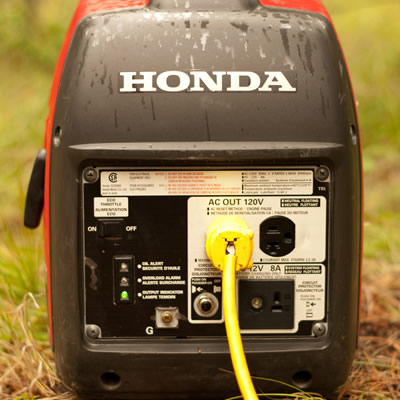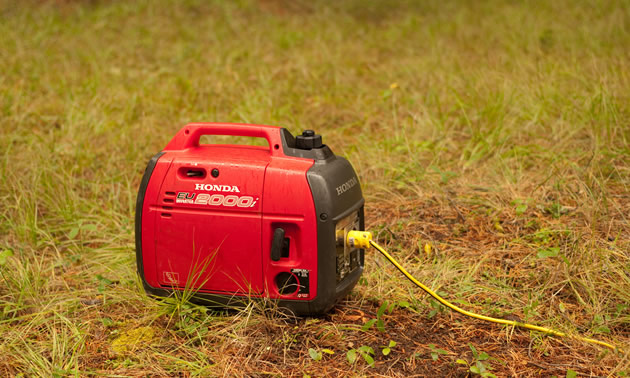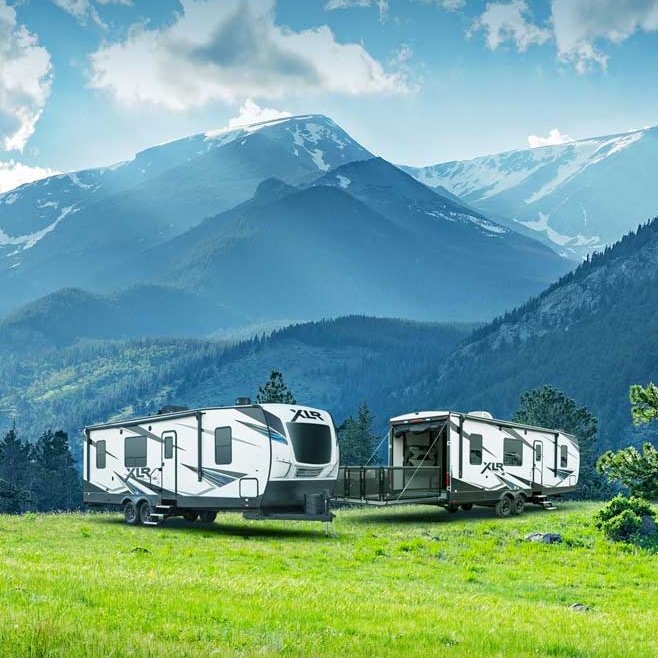The more you go ATVing and quadding, the more you want to do it. Bringing your motor toys camping might be the next step so you can stay out longer and go farther afield to remote riding locations and campsites.
Enter the world of generators. Portable generators gives campers the flexibility to be comfortable off the power grid and stay longer.
Generators are about flexibility. The right generator set, also called a gen-set, will allow you to power up your rig off-grid. It will open up opportunities to boondock or help you extend your stay in campsites with no power. If you’re someone who needs a hair dryer, toaster or waffle iron to make your outdoor experience fulfilling, a generator might be for you. You can buy a generator to fulfill your electrical needs or one for an occasional RV battery top-up.
The key to getting what you need is starting with what you need and then adding what you want. Here are five factors to consider when choosing a generator.
An inverter-generator or a conventional generator?
Regular generators run at a straight 3,600 r.p.m. and deliver power directly from the alternator. However, they may not be compatible with sensitive electronic equipment.

The special circuitry of inverter generators protects sensitive electronic equipment. — Photo courtesy Timothy Fowler
The speed of inverter generators varies with electrical load. Inverter generators deliver “clean” power that is compatible with electronic equipment like computers and microwaves. This clean power comes at an increased upfront cost but will keep your pricey electronic equipment safe.
Price considerations
That low-priced generator and bigger wattage output may be false economy. Plain-jane 2,000-watt generators are available at hardware and big box stores or shipped from Amazon starting at about $400 and go up with capacity. Inverter generators can be two or three times the price of a regular generator. The $2,000 price tag on an inverter generator of the same size seems ridiculous, but it would be a shame if that bargain generator cooked your brand new laptop.
Noise considerations
The sound level of your gen-set will increase the further you get from the moment you’re so proud of the low price you paid. And the longer you listen to pistons hammering and exhaust barking in your previously quiet campsite, the more you and your neighbours will wish you’d paid a bit more for a gen-set that’s quieter. Inverter generators are quieter by design.
Power and size considerations
The smaller generators start at 1,000 watts, which is enough to charge your rig’s battery, but the breaker might kick off when your waffle iron or hair dryer begins to heat. A 2,000-watt inverter generator will run a toaster, charge your RV batteries and run your computer but not your air conditioner. A 3,000-watt one will run everything you need including your air conditioner, and you can go bigger if you need more power.
A 1,000-watt inverter generator can be handled with one sturdy arm, but a 2,000-watt one requires two hands to lift. Any larger generator is a two-person job. Some generators are so heavy that their users just leave them in the back of the truck.
Reliability and options
Talk to your generator dealer about options. Some inverter generators have optional direct-current cables to boost your 12-volt batteries directly. Check plug options. Make sure you have the outlets that match up with your needs.
Other units have secondary fuel tanks for extended runs, and some generators can be hooked up in a series so two 1,000-watt generators can function as a single 2,000-watt generator.
When you first start looking for a generator, the variability in price is shocking. It is important to understand that the variability in function and purpose is equal to the difference in price. Be clear about what your application is and what you require from your generator. Don’t settle for an inexpensive generator that you will regret owning every time you pull the start cord. Finding the right generator or inverter generator gets ATVers to places they can only go by cutting the power cord.








Comments